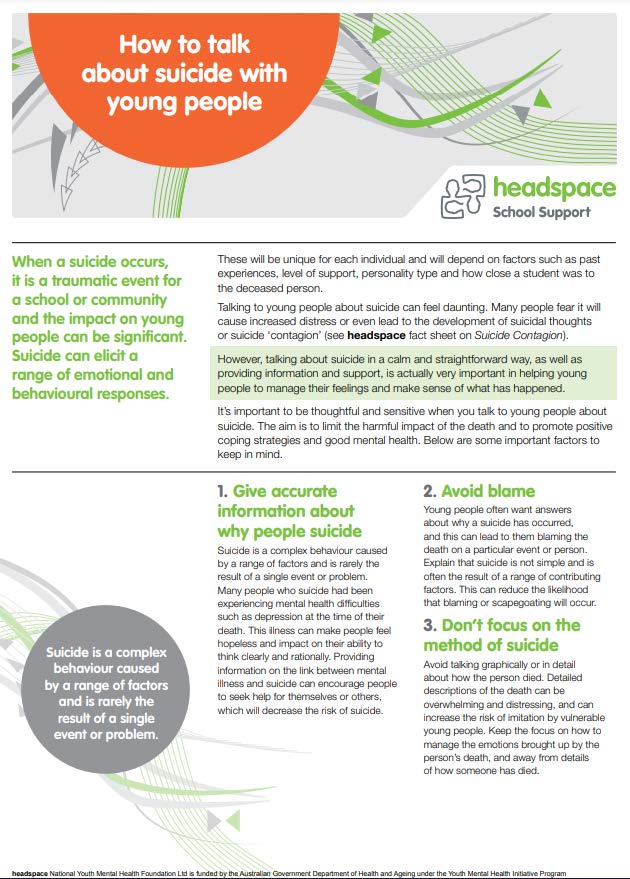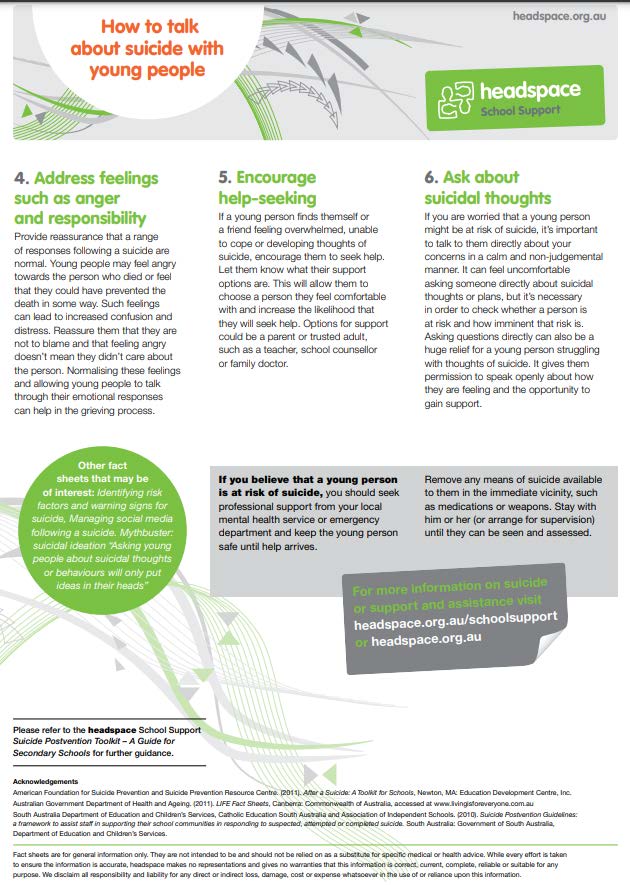Click here to download this letter and further information
Monday, 3 May 2021
Dear Parent/Caregiver
I am writing to you with some sad news about a member of our school community.
One of our Year 11 students died by suicide over the weekend. Our thoughts and heartfelt sympathy are with the student’s family and friends. All students who were at school today have been notified of this tragic loss to our school community.
The most important protective factor for your children following this news is for your young people to be able to have open discussions about suicide, mental health, and to be able to communicate their own support needs. We encourage you all to have open conversations with your young person about positive ways of seeking help if they are feeling low or hopeless.
Today and over the coming weeks, you may be concerned about the reactions of your child to this news. Many students will wish to talk with their parents, so I have attached some general information which may assist you in those conversations. I also encourage you to let your child know that you are aware of this incident and that you will listen to their concerns at any time they wish to share them. Staying connected and engaged with your child is one of the best ways to support them (when talking about the issue of death try to include discussion about positive ways of managing problems). Each individual deals with grief in different ways. Two important messages to promote are:
- All of us should seek help from others when we feel down or vulnerable.
- Young people should tell an adult if they are worried about a friend or themselves expressing suicidal thoughts.
Unexpected deaths may trigger these feelings amongst students and staff, as well as their parents, family and friends.
Wodonga Senior Secondary College will be concentrating on supporting our students and staff over the next months. This means, among other things, returning the school to normal routines as soon as possible and recognising that students can be affected by this event for many months to come. If your child is already using the services of a mental health professional, you should ensure this information is passed on to that professional. A list of helpful websites and services is included in the attachments to this letter.
Please feel free to contact the school on (02) 6043 7500 for further information or if you have any concerns about your child. Contacting the school is an important way of ensuring you receive consistent and accurate information and for us to be aware of all parent concerns.
Yours Sincerely,
Vern Hilditch
Executive Principal
Wodonga Senior Secondary College
Click here to download this letter and further information
When talking with your children remember…
Each child’s or adolescent’s response will be unique and a wide range of reactions are possible.
Their reaction will be influenced by their personality, their past relationship with the deceased or injured person, what is happening in their life now and their ability to adjust to change. Your child, whatever age, needs to find safe ways to express their feelings. They may feel confusion, anger,aggression, withdrawal, fear, guilt, denial, blame, betrayal, abandonment, hurt and sadness. Parental understanding, reassurance and attention are very important at this time. Be guided by your child’s need to talk but make it clear to them that you will be available whenever they need you.
Children and adolescents who have experienced other concerns or losses in their lives may find it harder to cope.
Children and adolescents who have experienced loss (e.g. separation/divorce of parents, death of a relative or pet, moving house/school) may find it harder to cope. They may become upset and need to express their feelings about these other concerns, even though they may have appeared to be coping before the event. If your child is already using the services of a psychologist or psychiatrist for wellbeing concerns, you should ensure they are made aware of this event.
Children and adolescents may have many questions, they may want to know exactly what happened.
The school will have provided your child with consistent information about the incident. Details about the way an untimely death occurred is not provided to students as this information is
generally considered to be potentially harmful to students’ wellbeing. As parents, it is important to steer discussion towards the positive “help seeking” actions people can take, such as talking to a trusted adult (e.g. parent, counsellor, teacher, relative or friend), or using the agencies or websites listed in the next attachment.
“Tell an adult if you are worried about a friend.”
This is an important message to share with you child in any discussion about how they are coping with what has happened. Children and adolescents sometimes share their feelings about death with friends: in conversations, letters, e-mails, text messages, on the internet, etc. If young people are aware of friends who they fear may hurt themselves they should tell an adult immediately. Nothing is more important than protecting a life.
Monitor the Internet and mobile communication tools
Following an untimely death, students will be texting news about the death (both accurate and rumoured), calling for impromptu gatherings (both safe and unsafe), creating online memorials
(both moving and risky), and posting messages (both appropriate and hostile) about the deceased. This happens quickly and often to large numbers of people. You can proactively
monitor, moderate and influence what and how information is shared between students.
Be aware that you or your child may be affected by possible media responses to the event
You may decide to protect against certain coverage or watch television news coverage together so that you can discuss any reactions or concerns and ensure your child feels supported. Hopefully, media reporting of specific details around untimely deaths will not occur. However, if it does, be aware that it can contribute to young people’s vulnerability.
Some adolescents may show reactions weeks/months/a year after an event
If you are concerned about your child’s reactions – for example, if there are changes to their behaviour such as their socialising or school work patterns – it is important to speak to the Year Level Co-ordinator or Wellbeing staff at the school. This may result in referral to one of the agencies listed in the next attachment.
Be aware that school staff will also be affected
While everyone will be working towards normalising school routines, some staff will be managing difficult emotions. Adult counselling support is provided to all our school staff through a process outside the school.
Respond to community concern with respect
If speaking with other members in the community, try to reinforce that the approach is to respect the bereaved/affected family and to encourage help seeking actions in young people for their own wellbeing and when they have concerns about their friends.
Where can parents and young people get more information and help?
Child and Adolescent Mental Health Services (CAMHS) offer assessment and treatment depending on clinical
need (crisis, single session, specific assessments, ongoing case management, targeted intensive outreach case
management, community based, sub-acute and acute mental health care). CAMHS Albury Wodonga is accessed via
the Mental Health Triage Line on 1300 104 211.
ARAFEMI Carer Helpline provides free, confidential information, support and referral for family, carers and friends of
people with a mental illness. 1300 550 265, 9am to 5pm weekdays. www.arafemi.org.au
Area Mental Health Services (AMHS) triage provides mental health information, advice and referral. Each AMHS
has a centralised triage number, www.health.vic.gov.au/mentalhealth/services
Australian Centre for Grief and Bereavement provides a range of education, counselling, research and clinical services for those working in and affected by experiences of grief and bereavement. 1800 642 066 www.grief.org.au
Beyondblue provides information about the signs and symptoms of depression, available treatments, how to get help
and links to other relevant services and support groups. 1300 22 4636, 24 hours/7 days www.beyondblue.org.au
The Compassionate Friends Victoria Inc. offers friendship and understanding to families following the death of a
son or daughter, brother or sister. (03) 9888 4944; 1800 641 091, 24 hours/7days www.compassionatefriendsvictoria.org.au
Griefline provides confidential telephone counselling services to anyone in the community who may need support in
order to express their feelings and experiences. (03) 9935 7400, 12noon to 3am/7 days www.griefline.org.au
Eheadspace offers online and telephone mental health support to young people aged 12 to 25 and their families or friends. Young people can register at www.eheadspace.org.au or call 1800 650 890. Webchat and telephone support is available from 9am to 1am and e-mail is available 24 hours a day.
Kids Help Line 1800 55 1800 is a 24 hour telephone and online counselling service for young people from 5-25 years of age www.kidshelpline.com.au
Lifeline is a 24 hour telephone counselling service providing access to crisis support, suicide prevention and mental health support services. 13 11 14 www.lifeline.org.au
Mind Health Connect provides information on mental health care, finding relevant support and resources to meet your needs. www.mindhealthconnect.org.au
OCD and Anxiety helpline provides assistance to callers to understand and manage symptoms of anxiety disorders and depression, and referral to community and health services. 1300 269 438 or (03) 9830 0533, 10am to 4pm weekdays. www.arcvic.org.au/our-services/helpline
Parentline is a state-wide telephone counselling, information and referral for parents and carers with children from birth to eighteen years. 13 22 89, 8am to midnight/7 days www.education.vic.gov.au/earlychildhood/parentline/
Reach Out! is a web-based service that encourages young people to help themselves through tough times. The aim of the service is to improve young people’s mental health and wellbeing by providing support, information and referrals in a format designed for young people. http://au.reachout.com
SANE Australia provides information about mental illness treatments, symptoms, medications, where to go for support and help for carers. 1800 18 SANE (7263), 9am to 5pm weekdays. www.sane.org/helpline/helpline-online
Suicide Callback provides crisis counselling to people at risk of suicide, carers for someone who is suicidal and those bereaved by suicide. 1300 659 467, 24 hours/7 days www.suicidecallbackservice.org.au/
SuicideLine VIC provides specialist telephone counselling and information to anyone affected by suicide. 1300 651 251, 24 hours/7 days. www.suicideline.org.au
The Black Dog Institute is a not for profit organisation that offers specialist expertise in mood disorders (depression and bipolar disorder). http://www.blackdoginstitute.org.au/
Ybblue, the youth program of beyondblue, promotes the message that it’s acceptable to talk about depression and encourages young people, their families and friends to look out for each other and to get help when it is needed. A set of youth fact sheets with information on a variety of topics, including how to recognise depression and how to talk about it, what services are available to help young people and how to help friends and family who may be going through a tough time can be downloaded from the site. www.youthbeyondblue.com
Click here to download this letter and further information


